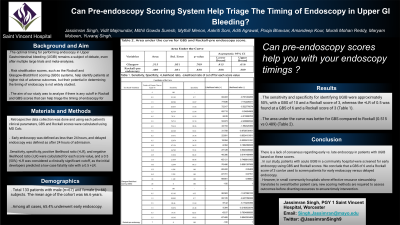Monday Poster Session
Category: GI Bleeding
P2039 - Can Pre-Endoscopy Scoring System Help Triage the Timing of Endoscopy in Upper GI Bleeding?
Monday, October 23, 2023
10:30 AM - 4:15 PM PT
Location: Exhibit Hall

Has Audio

Jassimran Singh, MD
Saint Vincent Hospital
Worcester, MA
Presenting Author(s)
Jassimran Singh, MD1, Vidit Majmundar, MD1, Mithil Gowda Suresh, MD1, Mythili Menon Pathiyil, MD1, Aditi Agrawal, MD2, Pooja Bhavsar, MBBS3, Yuvaraj Singh, MD4
1Saint Vincent Hospital, Worcester, MA; 2St. Elizabeth's Medical Center, Worcester, MA; 3BJ Medical College, Ahemdabad, Gujarat, India; 4University of Massachusetts, Worcester, MA
Introduction: The optimal timing for performing endoscopy in Upper Gastrointestinal bleeding (UGIB) remains a subject of debate, even after multiple large trials and meta-analyses. Risk stratification scores, such as the Rockall and Glasgow-Blatchford scoring (GBS) systems, help identify patients at higher risk of adverse outcomes, but their potential in determining the timing of endoscopy is not widely studied. The aim of our study was to analyze if there is any cutoff in Rockall and GBS scores that can help triage the timing of endoscopy for UGIB.
Methods: Retrospective data collection was done and using each patient's clinical parameters, GBS and Rockall scores were calculated using MD Calc. Early endoscopy was defined as less than 24 hours, and delayed endoscopy was defined as after 24 hours of admission. Sensitivity, specificity, positive likelihood ratio (+LR), and negative likelihood ratio (-LR) were calculated for each score value, and a 0.5 (50%) +LR was considered a clinically significant cutoff, as the initial developers predicted a low case fatality rate with a 0.5 +LR. Data analysis was done using IBM SPSS Statistics v.20, and a p-value < 0.05 was considered significant.
Results: Total 133 patients with male (n=67) and female (n=66) subjects. The mean age of the cohort was 66.6 years. Among all cases, 65.4% underwent early endoscopy. Figures 1 & 2 show the symptoms and endoscopy findings for each group. The sensitivity and specificity for identifying UGIB were approximately 50%, with a GBS of 10 and a Rockall score of 3, whereas the +LR of 0.5 was found at a GBS of 6 and a Rockall score of 3 (Table 1). The area under the curve was better for GBS compared to Rockall (0.515 vs 0.489).
Discussion: There is a lack of consensus regarding early vs. late endoscopy in patients with UGIB based on these scores. In our study, patients with acute UGIB in a community hospital were screened for early endoscopy using GBS and Rockall scores. We conclude that a GBS of 6 and a Rockall score of 3 can be used to screen patients for early endoscopy versus delayed endoscopy. However, in small community hospitals where effective resource stewardship translates to overall better patient care, new scoring methods are required to assess outcomes before diverting resources to ensure timely intervention.

Disclosures:
Jassimran Singh, MD1, Vidit Majmundar, MD1, Mithil Gowda Suresh, MD1, Mythili Menon Pathiyil, MD1, Aditi Agrawal, MD2, Pooja Bhavsar, MBBS3, Yuvaraj Singh, MD4. P2039 - Can Pre-Endoscopy Scoring System Help Triage the Timing of Endoscopy in Upper GI Bleeding?, ACG 2023 Annual Scientific Meeting Abstracts. Vancouver, BC, Canada: American College of Gastroenterology.
1Saint Vincent Hospital, Worcester, MA; 2St. Elizabeth's Medical Center, Worcester, MA; 3BJ Medical College, Ahemdabad, Gujarat, India; 4University of Massachusetts, Worcester, MA
Introduction: The optimal timing for performing endoscopy in Upper Gastrointestinal bleeding (UGIB) remains a subject of debate, even after multiple large trials and meta-analyses. Risk stratification scores, such as the Rockall and Glasgow-Blatchford scoring (GBS) systems, help identify patients at higher risk of adverse outcomes, but their potential in determining the timing of endoscopy is not widely studied. The aim of our study was to analyze if there is any cutoff in Rockall and GBS scores that can help triage the timing of endoscopy for UGIB.
Methods: Retrospective data collection was done and using each patient's clinical parameters, GBS and Rockall scores were calculated using MD Calc. Early endoscopy was defined as less than 24 hours, and delayed endoscopy was defined as after 24 hours of admission. Sensitivity, specificity, positive likelihood ratio (+LR), and negative likelihood ratio (-LR) were calculated for each score value, and a 0.5 (50%) +LR was considered a clinically significant cutoff, as the initial developers predicted a low case fatality rate with a 0.5 +LR. Data analysis was done using IBM SPSS Statistics v.20, and a p-value < 0.05 was considered significant.
Results: Total 133 patients with male (n=67) and female (n=66) subjects. The mean age of the cohort was 66.6 years. Among all cases, 65.4% underwent early endoscopy. Figures 1 & 2 show the symptoms and endoscopy findings for each group. The sensitivity and specificity for identifying UGIB were approximately 50%, with a GBS of 10 and a Rockall score of 3, whereas the +LR of 0.5 was found at a GBS of 6 and a Rockall score of 3 (Table 1). The area under the curve was better for GBS compared to Rockall (0.515 vs 0.489).
Discussion: There is a lack of consensus regarding early vs. late endoscopy in patients with UGIB based on these scores. In our study, patients with acute UGIB in a community hospital were screened for early endoscopy using GBS and Rockall scores. We conclude that a GBS of 6 and a Rockall score of 3 can be used to screen patients for early endoscopy versus delayed endoscopy. However, in small community hospitals where effective resource stewardship translates to overall better patient care, new scoring methods are required to assess outcomes before diverting resources to ensure timely intervention.

Figure: Figures showing the frequency of symptoms and endoscopy findings in both early and delayed groups.
Disclosures:
Jassimran Singh indicated no relevant financial relationships.
Vidit Majmundar indicated no relevant financial relationships.
Mithil Gowda Suresh indicated no relevant financial relationships.
Mythili Menon Pathiyil indicated no relevant financial relationships.
Aditi Agrawal indicated no relevant financial relationships.
Pooja Bhavsar indicated no relevant financial relationships.
Yuvaraj Singh indicated no relevant financial relationships.
Jassimran Singh, MD1, Vidit Majmundar, MD1, Mithil Gowda Suresh, MD1, Mythili Menon Pathiyil, MD1, Aditi Agrawal, MD2, Pooja Bhavsar, MBBS3, Yuvaraj Singh, MD4. P2039 - Can Pre-Endoscopy Scoring System Help Triage the Timing of Endoscopy in Upper GI Bleeding?, ACG 2023 Annual Scientific Meeting Abstracts. Vancouver, BC, Canada: American College of Gastroenterology.
